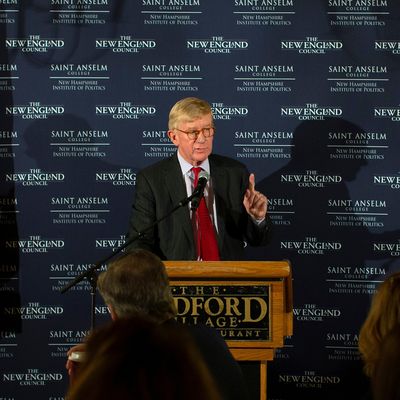
When former Massachusetts governor William Weld formed a presidential exploratory committee earlier this year to look at a primary challenge to Donald Trump, some observers seemed to take him seriously. I explained in a rebuttal how insanely out of touch Weld was with the party that he abandoned in 2016 to accept the second spot on the Libertarian Party ticket, and how intensely popular the incumbent is with rank-and-file Republicans (albeit not with the shrinking band of #NeverTrump elites overrepresented in opinion journalism).
But now that Weld has formally announced his candidacy, it’s probably a good time to put his bid into the proper historical context by distinguishing it from serious primary challenges to incumbent presidents.
There have been four post–World War II intraparty challenges to incumbent presidents that represented very serious challenges to their renomination:
* In 1952 Tennessee senator Estes Kefauver beat Harry Truman in the New Hampshire primary, leading directly to Truman’s decision not to seek reelection.
* In 1968, Minnesota senator Eugene McCarthy held Lyndon Johnson to a surprisingly narrow victory in New Hampshire; with polls showing McCarthy would likely defeat Johnson in the next major primary in Wisconsin, and with LBJ focused on the Vietnam War’s damage to his legacy, he folded his tent.
* In 1976, Ronald Reagan came breathtakingly close to denying renomination to Gerald Ford, the appointed vice-president who got the big job when Richard Nixon resigned less than two years earlier. Ford went on to lose narrowly to Jimmy Carter in the general election, and Reagan succeeded Carter four years later.
* In 1980, Ted Kennedy launched a much-anticipated challenge to an unpopular Carter, but foundered due to a series of gaffes and Carter’s skillful use of presidential power. As in the three earlier examples, the incumbent president’s party subsequently lost the general election.
There have been two other occasions where primary challenges represented significant ideological threats to the unity of the incumbent president’s party, if not to his renomination:
* In 1964 Alabama’s segregationist governor, George Wallace, ran against LBJ surrogates in three northern Democratic primaries (Wisconsin, Indiana, and Maryland), losing but doing well enough to shock those who assumed his style of politics wouldn’t travel beyond the Deep South. This was an early distant warning of the civil-rights backlash that ultimately unraveled the New Deal coalition for good.
* In 1992 conservative pundit Pat Buchanan challenged George H.W. Bush, and never won a primary, but did well enough to expose the incumbent’s weak support among conservatives upset at his betrayal of a no-new-taxes pledge. Poppy, of course, lost in the general election.
Weld has none of the intraparty strengths, and Trump has none of the intraparty weaknesses, displayed in any of these six examples. If there is any precedent his challenge to Trump resembles, it’s probably the dual 1972 candidacies of two Republican congressmen opposing Richard Nixon in 1972: antiwar Californian Pete McCloskey, and Ohio conservative John Ashbrook. McCloskey’s 19 percent in New Hampshire represented the peak of this twin challenge; Ashbrook never broke double digits. At the 1972 Republican National Convention, Nixon won 1,347 delegates, with McCloskey winning one, and Ashbrook getting skunked. Weld will be lucky to match Ashbrook.






























